

McCulloch v. Maryland (1819) Worcester v. Georgia. Ruling of maryland vs mcculloch. 4 Wheat. 159 McCULLOCH v.
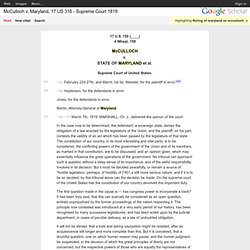
STATE OF MARYLAND et al. Supreme Court of United States. 162*162 February 22d-27th, and March 1st-3d. Webster, for the plaintiff in error,[(a)]. 166*166 Hopkinson, for the defendants in error. Jones, for the defendants in error. Martin, Attorney-General of Maryland. 180*180 197*197 March 7th, 1819. In the case now to be determined, the defendant, a sovereign state, denies the obligation of a law enacted by the legislature of the Union, and the plaintiff, on his part, contests the validity of an act which has been passed by the legislature of that state. The first question made in the cause is — has congress power to incorporate a bank? It will not be denied, that a bold and daring usurpation might be resisted, after an acquiescence still longer and more complete than this. Gale U.S. History In Context - Document. Gale U.S. History In Context - Document. Gale U.S. History In Context - Document. The Tariff History of the United States (Part II) by F.W. Taussig.
With this amendment, the bill was finally passed by the Senate, the vote being 26 to 21.
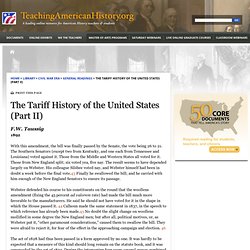
The Southern Senators (except two from Kentucky, and one each from Tennessee and Louisiana) voted against it. Those from the Middle and Western States all voted for it. Those from New England split; six voted yea, five nay. The result seems to have depended largely on Webster. His colleague Silsbee voted nay, and Webster himself had been in doubt a week before the final vote.43 Finally he swallowed the bill; and he carried with him enough of the New England Senators to ensure its passage.
Webster defended his course to his constituents on the round that the woollens amendment (fixing the 45 percent ad valorem rate) had made the bill much more favorable to the manufacturers. Gale U.S. History In Context - Document. Politics in The War of 1812. The Federalist Critique of Jefferson In January 1815, Harrison Gray Otis arrived in Washington, D.C.
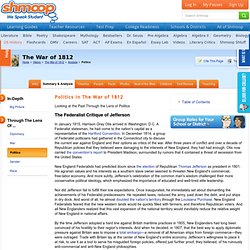
A Federalist statesman, he had come to the nation's capital as a representative of the Hartford Convention. In December 1814, a group of Federalist politicians had gathered in the Connecticut city to discuss the current war against England and their options as critics of the war. After three years of conflict and over a decade of Republican policies that they believed were damaging to the interests of New England, they had had enough.
Otis now carried the convention's report to President Madison, surrounded by rumors that it contained a threat of secession from the United States. New England Federalists had predicted doom since the election of Republican Thomas Jefferson as president in 1801. Nor did Jefferson fail to fulfill their low expectations. Federalist Opposition to the War. Gale U.S. History In Context - Document. Tax Day “Tea Parties” Planned Across the Nation. Tens of thousands are expected to turn out for the Tea Parties, which have largely been organized online by fiscal conservatives who are upset about President Obama's spending policies.
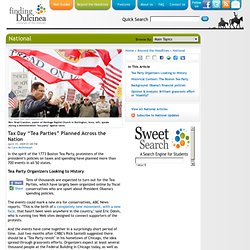
The events could mark a new era for conservatives, ABC News reports. "This is the birth of a completely new movement, with a new face, that hasn't been seen anywhere in the country," said Eric Odom, who is running two Web sites designed to connect supporters of the protests. And the events have come together in a surprisingly short period of time. Just two months after CNBC's Rick Santelli suggested there should be a "Tea Party revolt" in his hometown of Chicago, the idea spread through grassroots efforts. Organizers expect at least several thousand people at the Federal Building in Chicago today, as well as more than 10,000 near the statehouse in Atlanta and more than 7,000 in Dayton, to name a few.
Diplomatic Challenges in an Age of European War. While serving as a Kentucky Representative to the Congress, Henry Clay was a leading "War Hawk," strongly in favor of going to war for a second time with Britain to ensure America's place in the West.
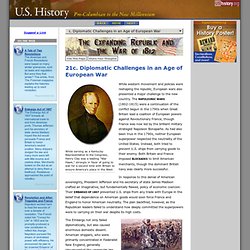
While western movement and policies were reshaping the republic, European wars also presented a major challenge to the new country. The Napoleonic Wars (1802-1815) were a continuation of the conflict begun in the 1790s when Great Britain lead a coalition of European powers against Revolutionary France, though France was now led by the brilliant military strategist Napoleon Bonaparte.
As had also been true in the 1790s, neither European superpower respected the neutrality of the United States. Instead, both tried to prevent U.S. ships from carrying goods to their enemy. Both Britain and France imposed blockades to limit American merchants, though the dominant British navy was clearly more successful.
The Embargo not only failed diplomatically, but also caused enormous domestic dissent. NoodleTools. Gale - Enter Product Login. eLibrary Search. Destiny Quest. Google Scholar. Sweet Search. Student Research Center - powered by EBSCOhost: Basic Search. Historical Newspapers. History Study Center - Home Page. Gale U.S. History In Context - Home.